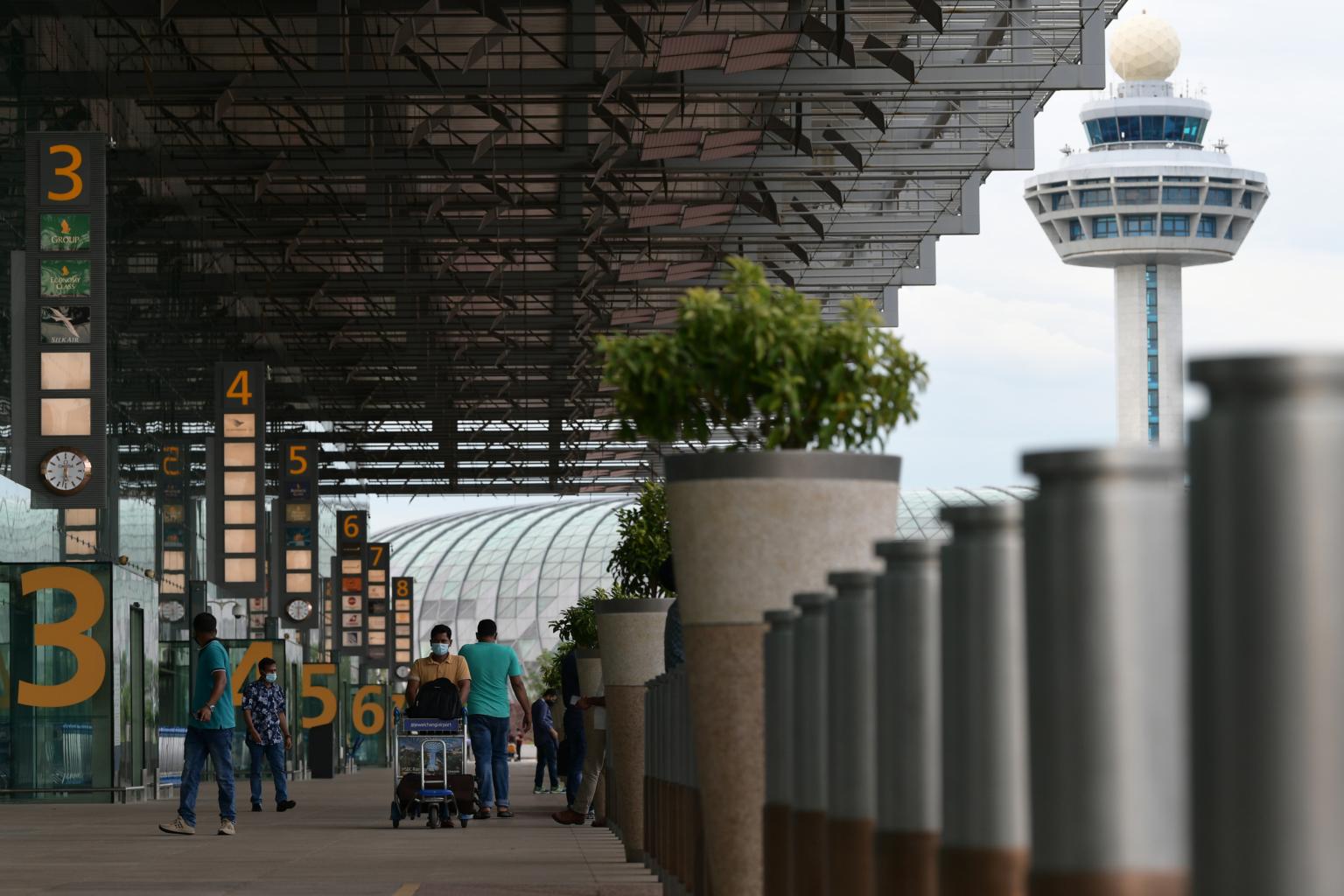About 2,600 Omicron infections imported into Singapore so far: Iswaran
Sign up now: Get ST's newsletters delivered to your inbox

The bulk of the imported cases were citizens, permanent residents and long-term pass holders returning home.
PHOTO: ST FILE
Follow topic:
SINGAPORE - About 2,600 Omicron infections have been imported into Singapore so far, Transport Minister S. Iswaran told Parliament on Monday (Jan 10).
This is about 60 per cent of the 4,322 Omicron infections recorded here so far.
The bulk of the imported cases were citizens, permanent residents and long-term pass holders returning home, with short-term travellers making up less than 10 per cent.
The key sources of the imported infections were the United States and Britain, which each contributed to 16 per cent of the cases, and India, which contributed to 11 per cent.
This broadly corresponds to traveller volumes on the 24 vaccinated travel lanes (VTLs) launched here since September, said Mr Iswaran.
It is also influenced by the incidence of Omicron in these countries, he added. The three countries have experienced a surge in cases due to the new variant.
These infections come amid a significant increase in passenger traffic at Changi Airport over the past year - from 3 per cent of pre-Covid-19 levels at the start of last year to 15 per cent at end-December.
This was spurred by the launch of the VTLs, Mr Iswaran said.
Addressing questions filed by MPs on the reopening of borders, measures to safeguard airport workers, as well as the outlook for the aviation industry for the coming year, he added: "Barring unexpected setbacks like Omicron, we anticipate further recovery in 2022."
As at Dec 31 last year, more than 220,000 travellers have entered Singapore via air and land VTLs. Less than 1 per cent were found to be positive for Covid-19 based on their on-arrival tests.
As at Dec 31 last year, more than 220,000 travellers have entered Singapore via air and land VTLs. Less than 1 per cent were found to be positive for Covid-19 based on their on-arrival tests.
The minister said recent adjustments made to the VTL scheme were essential to balancing the need to manage the risk of importing Omicron cases while also minimising disruption to travellers who had already made VTL bookings to enter Singapore.
The authorities had to pump the brakes on these travel lanes due to Omicron.
New ticket sales for VTL flights and buses arriving into Singapore between Dec 23 last year and Jan 20 this year were frozen, quotas for arrivals after Jan 21 were halved, and three planned VTLs for Qatar, Saudi Arabia and the United Arab Emirates were deferred indefinitely as a precautionary measure.
However, Mr Iswaran said Singapore must press on with its efforts to restore connectivity with the world as part of learning to live with Covid-19 and its variants.
"The VTL scheme is a useful pathfinder for us to establish, test and build confidence in safe reopening to vaccinated travellers. Ultimately, we want to work towards quarantine-free travel for all vaccinated travellers," he said.
Mr Iswaran said Singapore does not restrict any airline from applying to operate VTL flights and the overall quota of inbound VTL travellers is allocated to airlines based on the plans they submit to the Civil Aviation Authority of Singapore (CAAS).
Asked if more VTL flights will be allowed during festive periods, the minister said the authorities will monitor demand for VTL flights and review quotas regularly, while taking into consideration prevailing public health assessments.
Mr Saktiandi Supaat (Bishan-Toa Payoh GRC) asked about other countries vying for Singapore's status as an aviation hub and the measures that can be taken to further increase passenger volumes at Changi Airport.
He cited a Nikkei article last month, which said that Indonesia is seeking to challenge Changi Airport and Kuala Lumpur International Airport as regional hubs via a $6 billion tie-up with Indian and French airport operators.
In response, Mr Iswaran said Changi is no stranger to competition.
"There will continue to be new hubs that will emerge... It is important that we mount a systemic response to preserve our competitiveness as an international aviation hub," he said.
Emerging from the Covid-19 pandemic in a safe and robust manner is key to this, Mr Iswaran added. This is so that travellers, airlines and the general population have the confidence that air travel can continue safely and that Changi Airport is one of the places they can travel through.
The minister added that the aviation sector has made a herculean effort to ensure safety in the past 12 to 18 months by inverting the operating model at the airport.
"A civilian airport in general is designed for an experience for passengers to interact and we have had to reverse that logic and start doing segmentation, testing, and all kinds of other necessary protocols to protect (travellers)," he said.
However, these protocols, while necessary, also place a limit on how much passenger volumes at the airport can grow.
Said Mr Iswaran: "We will have to work with our health authorities and the aviation partners to ascertain how much flexibility we have going forward and what are the possible rate-limiting steps, or aspects that we need to reconfigure, so that we can go for the next round of growth.
"Based on both global projections and our own anticipation... we should be able to do better this year. But how much and how fast really is a function of the environment and we need to always prioritise the public health assessment."
Ms Foo Mee Har (West Coast GRC) asked whether the authorities would consider requiring those entering Singapore via VTLs to have taken a Covid-19 booster jab.
In response, Health Minister Ong Ye Kung said it was his conjecture that booster shots will become a requirement for travel in due course, noting how the European Union has already implemented a guideline similar to Singapore's, where full vaccination status expires 270 days after one's second dose.

